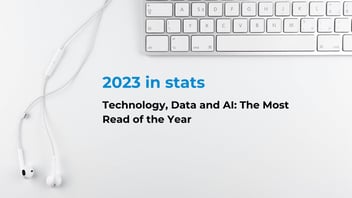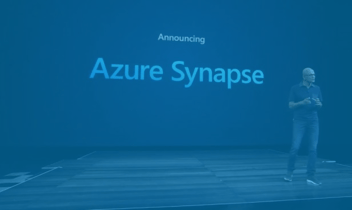Here are the top 8 Big Data tools that businesses can use to get insights and make data-driven decisions.
The quote “data is the new oil” is very popular in today’s business world. The value of the data does not stop growing, but extracting value from this data is not easy, especially when we work with large amounts of data. In this article we present the best Big Data tools for 2021.

In this article you will find...
- What Is Big Data?
- Big Data Tools That Every Business Should Know
- Data Lake Tools:
- 1. Azure Synapse
- 2. Azure Databricks
- 3. Snowflake
- 4. Amazon Web Services
- Data Integration Tools:
- 1. Azure Data Factory
- 2. Informatica
- Data Visualization Tools:
- 1. Power BI
- 2. Looker
- Conclusion
What Is Big Data?
Big Data are basically large data sets that are difficult to represent, cure, manage and operate in a short period of time using traditional database models.
Big Data can be used for many things. In the business field, Big Data helps companies translate a huge amount of information into useful business insights. As we have covered before in this blog, information and insights are not the same. So, when treated correctly, Big Data offers businesses priceless insights and KPIs.
With this information, businesses can, for example, use Big Data for customer segmentation and customer-centric strategies, to market the right products to the right customers, to design and produce products that meet the precise demands of customers, to improve their revenue and help them forecast market trends more accurately.
Even though big data tools can really impact your business, there are still areas where big data tools can not function to great effect. That's why it is so important to choose the right Big Data tool that suits the needs and particularities of your company.
Big Data Tools That Every Business Should Know
As it has already been mentioned, there are several big data tools in the market. Making the decision of which tool to use, can be a difficult choice.
It is important to note that while sourcing for a big data utility, you should also consider how user-friendly the application is. This is especially useful for small businesses that can not hire data scientists, analysts, and researchers.
Below, we offer a list of the best Big Data tools on the market, divided into three different fields according to their functionality: data storage, data integration and data visualization tools.
Data Lake Tools
A data lake is a data storage platform that can hold a lot of raw data —that is, in its original format— until you decide to do something with it and process it. As we have mentioned previously in this blog, a data lake is not the same as a data warehouse and, also, it is different from hierarchical storage repositories since a data lake relies on a flat architecture and does not store data in folders or files.
1. Azure Synapse
Azure is a cloud computing platform that serves as a basis for many data solutions. As explained previously in another post on this blog, Synapse Analytics is a rebranded version of the Azure SQL Data Warehouse. Among the improvements included in the new version, it is worth noting that now it integrates with Apache Spark and makes it possible to combine data warehousing and big data analysis in one service. Synapse features a convenient web interface that enables you to work with data by using SQL scripts, along with an SQL on-demand query service.
2. Azure Databricks
Now Azure Databricks achieves 50 times better performance thanks to a highly optimized version of Spark. Databricks also enables real-time co-authoring and automates versioning. Besides, it features runtimes optimized for machine learning that include many popular libraries, such as PyTorch, TensorFlow, Keras, etc.
3. Snowflake
This platform can be used for data warehousing, data science, data engineering, sharing, and application development. It enables you to easily secure your data and execute various analytic workloads. Snowflake also ensures a seamless experience when working with multiple public clouds.
4. Servicios Web de Amazon
It’s impossible to talk about big data without mentioning Amazon Web Services (AWS). Amazon Redshift is a data warehouse solution with great scalability capabilities. Redshift reduces the load time by using Massively Parallel Processing architecture and distributes queries among multiple nodes. It also features an SQL interface and enables you to benefit from the well-developed AWS ecosystem.
Data Integration Tools
1. Azure Data Factory
Azure Data Factory is a cloud solution that enables you to integrate data between multiple relational and non-relational sources, transforming it according to your objectives and requirements.
This tool allows you to create workflows and use both cloud and on-premise data sources thanks to over 90 built-in connectors. One of the great advantages of Data Factory is that it is not necessary to be good at programming and grouping Spark, as it allows the transformation of data through ADF flow activities. Data Factory also integrates with other Azure applications and programs, such as Data Warehouse, Synapse and Cosmos DB.
2. Informatica
This tool enables businesses to collect and process big data in real-time. It automates database management and enables you to manage your big data assets from anywhere. Informatica also features a big data parser, a smart data catalog, data relationship identification, and an intelligent data lake.
Data Visualization Tools
1. Microsoft Power BI
Power BI is a business intelligence platform oriented to business that offers organisations with nontechnical users tools to aggregate, visualize, share, analyze and create remarcable visualizations with data. In our previous blog post, we compared Power BI with Excel and explained how Power BI is easier to use than Excel. So, anyone familiar with Microsoft Excel will find it pretty easy to navigate through Power BI's user interface.
Microsoft Power BI is easy to integrate with other Microsoft products, making it a very flexible self-service utility that you can use even with little training.
Small to medium scale businesses can use the free version for their Big Data needs. There is also a professional version more suited for large corporations called Power BI Pro, which is available for a monthly subscription token.
Power BI can be deployed to find insights within the data of an organization. It is also useful for connecting different data sets, cleaning and transforming the data into a data model, as well as creating powerful, interactive and beautiful visuals of data using charts and graphs. Power Bi can even help your SEO strategy.
Power BI is also equipped with real-time answers to questions, and can also assist a user with forecasts to meet the particular metrics of their business. The tool has monthly updates that keep on improving its capabilities.
In short, Power BI is the ideal tool for business intelligence and to help your business make data-driven decisions.
At Bismart, as one of the preffered Microsoft's partner Power BI companies, we have experts on this tool. If you want to learn what we do with Power BI, you can read our previous blog post.
2. Looker
Looker is another big data analysis and visualization solution from Google. It has its own proprietary language LookML which might make it less approachable than its alternatives, but experienced data teams will certainly appreciate its data modeling layer that’s easy to reuse and maintain. It offers different options for data delivery and enables you to schedule the delivery of reports.
Conclusion
Big Data's tools are not only used to store data, but also to process it quickly. This allows companies to obtain better insights and to create new business strategies that promote the growth and expansion of the company.
The tools mentioned in this article are essential for any modern company, but choosing the right one is not always easy. There are no good or bad Big Data tools, at least those mentioned here, but their potential will depend on the needs, characteristics and peculiarities of each company. When working with any Big Data tool, it is essential to define clear objectives and choose the software that best meets the specific needs of the company. If you choose well, Big Data tools can help you improve your decision making processes and get to know your customers better.
If you need help choosing the right Big Data tool for your company, please contact us. We'll be happy to help!
Exclusively written for bismart.com. Prepared by Frank Hamilton | Frank Hamilton has been working as an editor at essay review service Writing Judge and as an author at Best Writers Online. He is a professional writing expert in such topics as blogging, digital marketing and self-education. He also loves traveling and speaks Spanish, French, German and English.



